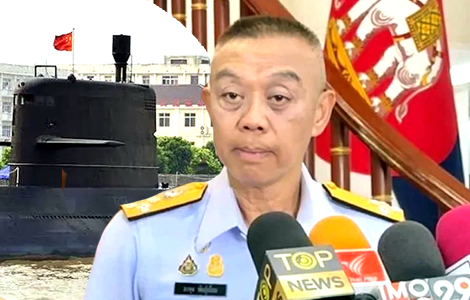Coy Prime Minister Srettha, on Tuesday, made it clear the Chinese had not fully accepted his request in October to replace the submarine with a frigate while the Navy Commander received praise from an unlikely source, Move Forward Committee Chairman Wiroj Lakkhanaadisorn.
The half-finished ฿13.5 billion Yuan class S26T Chinese submarine that the Pheu Thai government thought it had sunk in October resurfaced on Monday when the Commander-in-chief of the Royal Thai Navy sought legal clarification over the contract and suggested that the Shanghai based shipbuilders may not be in breach of the agreement after they proposed a Chinese built version of the German MTU-396 engine under licence from the German manufacturers. On Tuesday, in response, Prime Minister Srettha Thavisin told reporters the move by the Navy chief was appropriate.

Thailand’s Minister of Defence, Mr Sutin Klangsaeng, received a broadside on Monday when the Commander-in-chief of the Royal Thai Navy, Admiral Adung Phan-iam, held a press conference in which he revealed that the Navy was writing to the Attorney General’s office seeking clarification of its contract with a shipyard in Shanghai linked with the purchase of a Yuan class S26T submarine from China.
The matter of the politically controversial Chinese submarine had been considered finalised following the visit by Thai Prime Minister Srettha Thavisin to Beijing in October when he informed the Chinese that Thailand was seeking instead to purchase a frigate and to have the monies paid for the submarine credited against it.
฿10 billion already paid by the Royal Thai Navy for a submarine that was only half-built. It is now pursuing the contract to account for public funds
The contracting company in Shanghai is the China Shipbuilding and Offshore International Co (CSOC). It was reported to have half finished the project which was signed in 2017 at a value of ฿13.5 billion and against which the Thai government has already paid over ฿10 billion.
The contract was disrupted in 2019 when the Chinese shipbuilders informed the Royal Thai Navy that they were not in a position to supply a German-made MTU-396 diesel-powered engine produced by a subsidiary of Rolls Royce to the highest specification.
Since then there have been ongoing negotiations between the Chinese contractors, the People’s Liberation Army Navy and the Chinese government, the Royal Thai Navy and the Thai government, which had initially insisted that the German manufactured engine was a critical part of the contract.
Stalled Chinese submarine shines light on Rolls Royce firm supplying engines to China’s military
Correspondingly, even the previous Prime Minister, General Prayut Chan Ocha, a former member of the military, in April 2022, suggested that the failure of the Chinese contractor to supply the required engine under the contract would be valid grounds to terminate it.
Naval delegation from Thailand visited China in April 2023 for talks and to look at the Chinese-manufactured CHD-620 engine in operation
However, in April this year, the former Commander-in-chief of the Royal Thai Navy Admiral Choengchai Chomchoengpaet, together with a large delegation, visited China and observed the operation of a Chinese-made CHD-620 engine which was being proposed by the Chinese as a replacement for the German-made alternative.
The visit by the former naval commander earlier in the year resulted in negotiations where the Chinese offered concessions for the Royal Thai Navy to accept the replacement engine.
Later, in the summer, the Navy recommended the Chinese-made replacement engine to the government.
There then followed the installation of the Pheu Thai-led government led by Prime Minister Srettha Thavisin and the new Minister of Defense, Mr Sutin Klangsaeng.
Sub call due soon but closer ties between Chinese and Thai navies signalled by top-level visit
Navy may accept Chinese engine in new ฿13.5 billion sub if it gets an older one thrown in for free
Thailand cancels Chinese sub, wants credit for a new frigate. Tense talks that could yet go legal
Before Mr Srettha visited Beijing in October, the Minister of Defence, Mr Sutin, at Navy headquarters and following a meeting of top brass, announced that the government and the Navy had now decided to pursue the construction of a frigate after the Royal Thai Navy had made several alternative recommendations to his office.
Prime Minister delivered the bad news to China during his October visit to Beijing and the Chinese President told him he would look into the matter
During Prime Minister Srettha’s visit to Beijing in October, he communicated to the Chinese leadership including President Xi Jinping that the Thai government was now seeking a frigate vessel as a replacement for the Yuan class S26T submarine.
This followed the recommendation by Mr Sutin after he visited naval headquarters just days previously where the Minister of Defence outlined that naval officials had recommended several alternatives to the submarine, including a frigate and an offshore patrol vessel.
Before Mr Srettha’s visit to China, the cabinet is understood to have decided on this course of action.
While it was reported that during his negotiations with the Chinese leader Xi Jinping, Mr Srettha had received some assurance in principle, on Tuesday, when questioned about the surprise announcement by the Navy and the resurrection of the submarine contract for discussion, Mr Srettha made it clear that the Chinese leader had not fully accepted the replacement of the submarine with a frigate.
He told reporters that the Chinese leader only promised to look into the matter.
At his bombshell press conference on Monday, Admiral Adung suggested that communications between the Navy and its Chinese counterpart had not been released to the public and the media out of courtesy and respect for international etiquette.
Naval Commander-in-chief now says that the Chinese-made CHD-620 engine built under licence from Germany fulfils the terms of the 2017 contract
At any rate, he clarified to reporters that the Chinese-made CHD620 engine was manufactured by a Chinese contractor on licence from the German manufacturers of the MTU396 engine.
The Admiral suggested that this may be construed as fulfilling the original 2017 contract.
Previously, the Navy did not disclose this as it was waiting for approval from China to do so. China had just permitted its disclosure to the media and the public.
China produces the CHD-620 engines under a licence from the manufacturer in Germany, he asserted
Admiral Adung went further and referred to the inspection by the Royal Thai Navy delegation to China in April this year when he said: ‘representatives of the Royal Thai Navy dockyard witnessed the test of the engine in China which continued for 200 hours and concluded that it can be a substitute.’
Navy chief has written to the Office of the Attorney-General (OAG) seeking urgent clarification and expects a reply within 30 days on 3 key questions
In his stunning address to reporters, the Commander-in-chief said that he had written a letter to the Office of the Attorney-General (OAG) and other senior legal officials asking for clarification on three issues concerning the contract which the Navy signed with the Chinese shipyard.
The Navy leader pointed out that his service had received funding from the government to purchase a submarine through the proper channels and the Navy leadership was not clear if such a contract could be changed and replaced with one which supplies a frigate instead.
At the same time, he made it clear that the Royal Thai Navy was still committed to purchasing four submarines as a matter of strategy for the naval defence of the Kingdom.
He clarified that his letter to the Attorney General sought to establish 1. Whether the modified engine specified in the original contract was a material matter or a possible breach of contract or not. 2. Whether steps could be taken to modify the contract to supply a frigate in place of a submarine, or whether the original contract, which, significantly, expires at the end of December this year, will simply be considered at an end without fulfilment if the modified engine is deemed not acceptable. 3. The Admiral wants to know from the country’s legal authorities who has the power to decide to accept the modified engine under the original terms of the 2017 contract.
Prime Ministers Srettha and Prayut Chan Ocha both had assumed that failure by China to deliver the German MTU-396 engine was a breach of contract
The latter power has always, according to Prime Minister Srettha Thavisin and Prime Minister Prayut Chan ocha, been a matter for the government and ultimately the cabinet and the Minister of Defence provided that the 2017 contract was considered to be breached by the Chinese contractor and could therefore be terminated by the relevant Thai officials.
Admiral Adung told reporters that he expected a reply to the letter within 30 days and that he was taking this step to be responsible for the proper management of the Navy’s budget to the fullest possible extent.
In the aftermath of Prime Minister Srettha’s visit to Beijing in October, government officials were very clear that the final upshot of the decision by the Thai government to seek a replacement for the submarine in the form of a frigate, a surface naval vessel, could well end up in a legal wrangle with either the Chinese shipyard in Shanghai or even the Chinese state itself.
The previous government and key ministers had always insisted that the contract to purchase the Chinese submarine from China was an international contract between China and Thailand.
On Tuesday, Prime Minister Srettha said the move by the Naval Commander-in-chief was ‘appropriate’ and was coy about President Xi Jinping’s response
When questioned about the matter on Tuesday, Prime Minister Srettha said he accepted that the actions of the Royal Thai Navy commander were appropriate.
He also acknowledged that it could well turn out that the Chinese will not accept the replacement of the submarine with a frigate as the submarine project was now half complete.
The PM, in an open exchange with reporters, appeared coy when pressed by them to explain the reaction from President Xi Jinping when he informed him of the change of heart by Thailand’s government.
‘He promised to see. I’d rather use this word. He didn’t promise but he said he’ll take a look. I talked with Mr Xi Jinping, the President of the People’s Republic of China. We talked about many things. You yourself do not have much in-depth information. Yes, you have to listen to the information first,’ the Prime Minister reminded the reporters.
Move Forward’s Military Committee Chairman Wiroj Lakkhanaadisorn MP lauds the actions of the Royal Thai Navy Commander-in-chief as smart and correct
In the meantime, the shock announcement from the Navy has received some unlikely support from the Move Forward Party, where the Chairman of the House Military Committee, Mr Wiroj Lakkhanaadisorn MP hailed the Royal Thai Navy Commander-in-chief for following the legal procedures relating to the budgetary process and taking responsibility for the contract.
Mr Wiroj said that the contract was an international one and was subject to parliamentary oversight. He said the matter or any outcome must subsequently be debated and put before Parliament for approval.
The Move Forward Party MP said the Royal Thai Navy boss was right to act in such a careful manner when it comes to public resources.
Meanwhile, Mr Wiroj also criticised the Minister of Defence, Mr Sutin, for persistently suggesting that the Royal Thai Navy was happy to accept a replacement frigate instead of the contracted-for submarine.
Chairman highly critical of the Minister of Defence
Moreover, he emphasised the contract with China was an international one and called upon the Minister of Defence, Mr Sutin to uphold his constitutional duties in this regard to parliament.
As well as that, Mr Wiroj claimed that the contract between the shipyard in Shanghai and the Royal Thai Navy was covered under Article 178 of the Constitution and that any change to it must be approved by Parliament.
He praised the Commander-in-Chief of the Royal Thai Navy for his decision to seek legal clarification from the Office of the Attorney-General (OAG).
While he accepted that the matter may be a disappointment for the Minister of Defence, he said he was confident that the matter will now be brought before Parliament for discussion and an ultimate resolution.
Join the Thai News forum, follow Thai Examiner on Facebook here
Receive all our stories as they come out on Telegram here
Follow Thai Examiner here
Further reading:
Thailand cancels Chinese sub, wants credit for a new frigate. Tense talks that could yet go legal
Chinese nuclear-powered sub disaster, 55 dead in the Yellow Sea, a wakeup call for Thailand
Navy may accept Chinese engine in new ฿13.5 billion sub if it gets an older one thrown in for free
Sub call due soon but closer ties between Chinese and Thai navies signalled by top-level visit
War with China is a rising spectre that must be confronted as US General predicts conflict by 2025
Heat turned up over the Sukhothai naval tragedy with 19 thought to have perished and 10 missing
Former Pheu Thai finance minister expresses unease about US regional moves to counter China’s rise


















